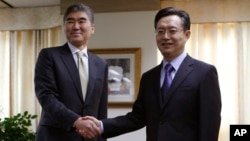South Korea’s top nuclear envoy said Wednesday that participants in the North Korean nuclear talks, except the government in Pyongyang, had reached a consensus to hold exploratory talks before any resumption of formal six-party discussions.
Hwang Joon-kook, Seoul's special representative for Korean Peninsula affairs, told reporters in Moscow that the exploratory talks would test Pyongyang’s will to denuclearize.
Hwang is visiting Moscow to discuss ways to resume the nuclear talks. He made the comments after meeting with Russia’s top nuclear envoy, Igor Morgulov.
According to Hwang, the U.S., China, South Korea, Japan and Russia have discussed the timing, format and venue of the exploratory talks. He said the plan would be passed to the North through proper channels, and he expressed hope that Pyongyang would respond to it positively.
The U.S. and the other countries have not yet commented publicly on the South Korean statement.
These renewed efforts to revive the talks come amid heightened tensions over joint military drills by the U.S. and South Korea. Earlier, the North proposed to suspend further nuclear tests in exchange for cancellation of the drills, which the U.S. rejected immediately.
The multistate talks have been stalled since December 2008. Recently, there have been sporadic efforts to revive the talks, but there are disagreements among the member states about conditions for their resumption. Washington and Seoul have maintained that Pyongyang should show a commitment toward denuclearization before they will return to the talks.
Beijing and Moscow have been seeking an unconditional resumption of the talks. Analysts in Seoul see the exploratory talks as a compromise reflecting positions from both sides.
Cho Tae-yong, South Korea’s first vice minister of foreign affairs, told lawmakers Wednesday that his government was focusing its efforts on cooperation among the five parties to change the North’s stance on the nuclear issue.
“North Korea is losing its allies due to its insistence on keeping nuclear weapons, and the other five parties are putting strong pressure [on North Korea]. The country is paying a high price,” Cho said.
On Tuesday, the top U.S. envoy for North Korean nuclear talks, Sung Kim, said Washington was willing to improve its relations with Pyongyang if the communist country abandoned its nuclear weapons program and addressed other concerns.
Jee Abbey Lee and Baik Sungwon contributed to this report, which was produced in collaboration with the VOA Korean service.




